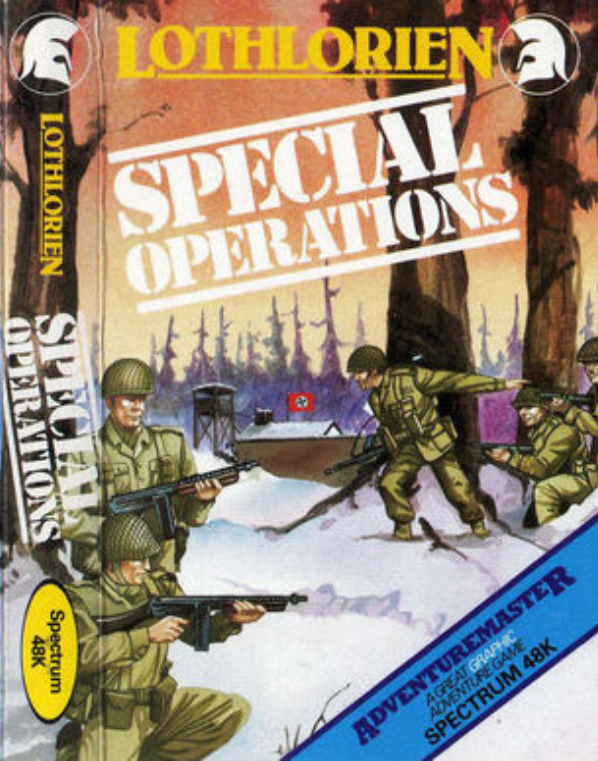
– Lieutenant Narwhal, why did you barge into my office like this?
– Are the rumors true? Did you give Special Operations to Jason Dyer from Renga in Blue?
– I don’t have to justify myself, but yes that’s true. We believe his set of sk…
– HIS SET OF SKILLS? He is the Interactive Fictions guy! Look at the art on the cover: 5 soldiers ready to fight. Does that scream “Interactive Fiction” to you?
– Fine! Fine! Let me show you the volunteers. You will pick 4 of them to go with you.
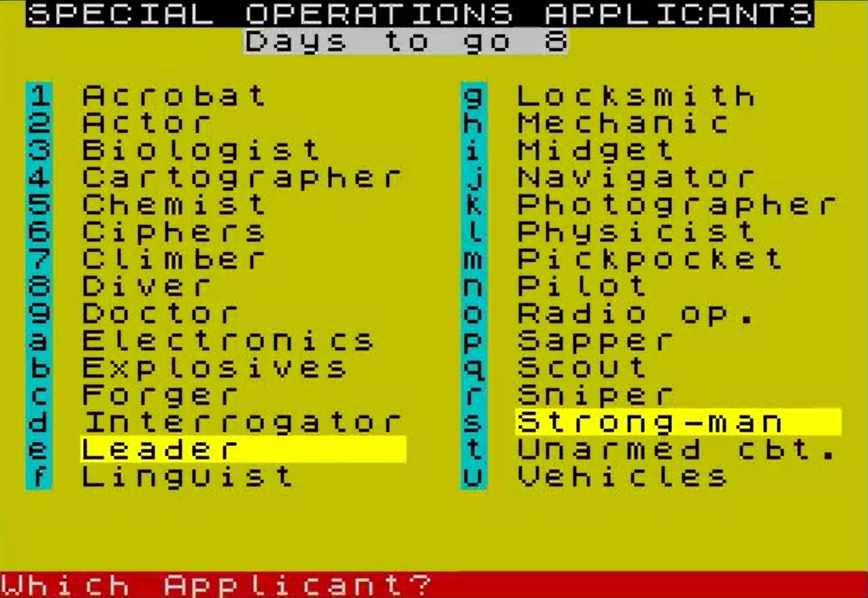
– WHAT THE HECK? An acrobat? An actor? A strongman? A “midget”? What’s this? The Greatest Showman?
MC Lothlorien is famous for its wargames, but it occasionally delved into other genres. Despite its name, Special Operations is an adventure game with occasional tactical combat, and the latter makes it somehow eligible for this blog. Of course, the real reason I’m covering it is that I could not leave a Lothlorien game called Special Operations behind me.
Special Operations starts by letting you choose your mission and a time frame. In my case, I have 90 hours to find and destroy a “Production Area” located in a complex below a compound.
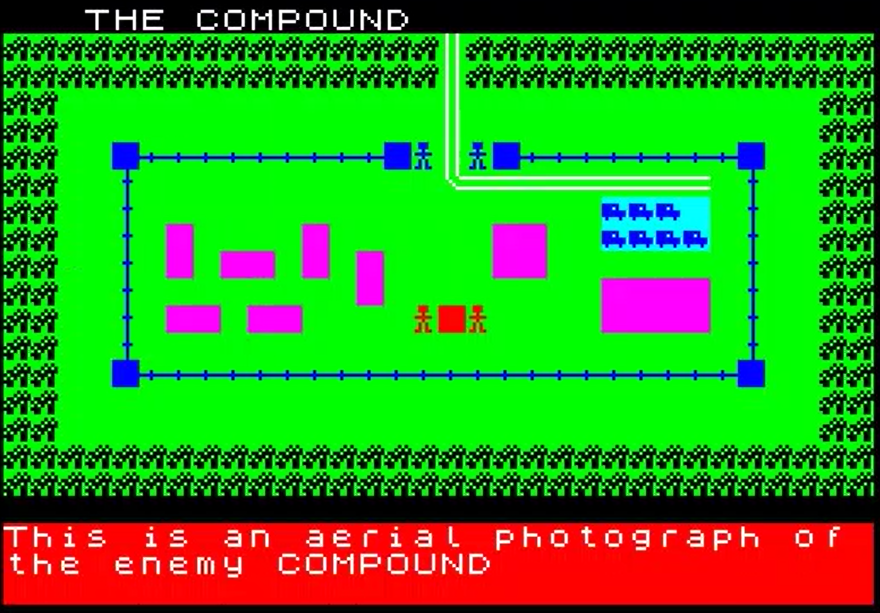
After choosing the mission, you have to select the team by interviewing candidates, as each applicant has an “obvious” skill and a second “hidden” skill. For instance, when interrogating the Locksmith, I learned that he was also a Linguist, while the Linguist told me he was also a pickpocket expert.
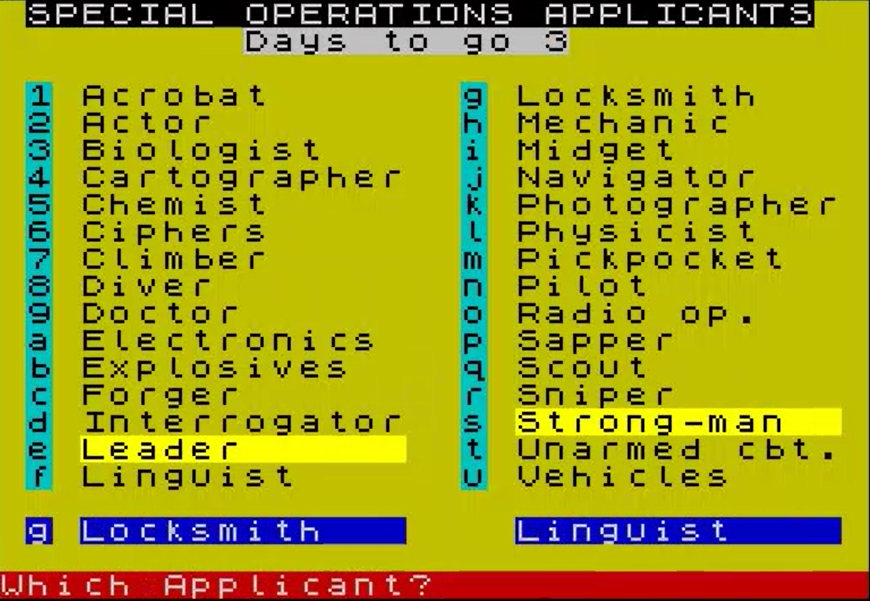
A poor choice of team could easily leave you in a walking-dead situation from the onset of the game, even though there are, according to the manual, 6 ways to get inside the complex. I have already tried once to win the game with the support of some commenters in the forum, and while we ended up in a walking-dead situation, we believe we found one of the possible combinations to complete the mission:
- A doctor to keep everyone healthy after tactical combats,
- An actor AND a linguist to fool the Germans into thinking that, yes, we are Germans ourselves, why do you ask? Either skill might be enough, but I’d like to be sure because our plan involves passing through a gauntlet of ID checks,
- A locksmith to avoid having to locate the keys for all the doors that might be on the way,
- Finally, a mission specialist, in this case an explosive expert,
There are 5 members in the team, but the first slot is always occupied by the leader, whose secondary skill in this case is strong-man – a skill I could never find a use for. This means I have 4 slots for 5 jobs. I was happy to find a Linguist Locksmith.
Ultimately, my team included:
- That Linguist Locksmith
- An actor and mechanic,
- A scout Doctor,
- An explosive expert who’s also a sapper,
- And finally, the leader-strongman.
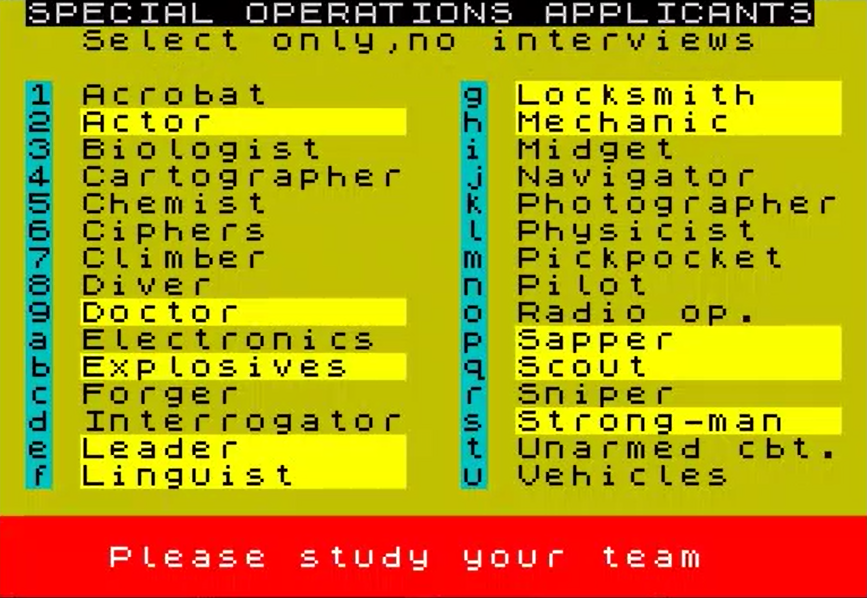
Leader is a special skill: it emulates any skill in the game, but can only be used 5 times for the entirety of the operation. The game justifies it by the “strain of command”.
Our team is dropped in the forest… and immediately intercepted by a German patrol (this was just luck on their part – or rather bad luck as it turned out for them).
I am going to politely describe combats in Special Operations as “streamlined”. You choose a target for each of your squad members and then move them by up to 2 squares. The Germans do the same, and then everyone shoots at their targets. Bullets fly in a straight line towards their target and are stopped by any obstacle. One hit is a wound, two hits are a kill.
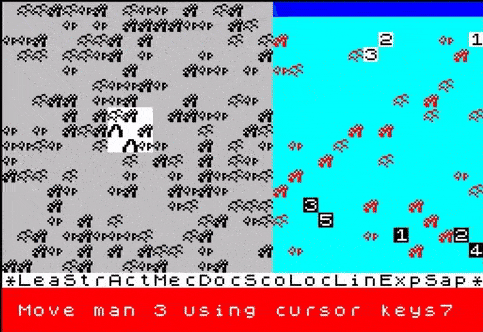
Given the ruleset, if one of your men can hit an enemy, then that enemy can hit him. The correct tactic is thus to position your men in a way so only one enemy at a time can possibly shoot at your guys, and then focus fire, rince & repeat. If one of your men is hit, move him behind cover and continue with the others.
Your soldiers don’t recover from their wounds after combat, so given you can’t reliably avoid being hit there is a slow attrition as you encounter more patrols. That is, if you don’t have a doctor skill, because the DOCtor skill immediately heals everyone fully, so you can be sure that’s the first skill I use after each combat. I don’t even need bandages!
After defeating the Germans, I can SEarch the place, and then loot the German passes & uniforms. They will be useful.

There are caves West and North of my position. Exploring them, I find a mysterious book in one, and a broken radio in the other. I pick up both items.
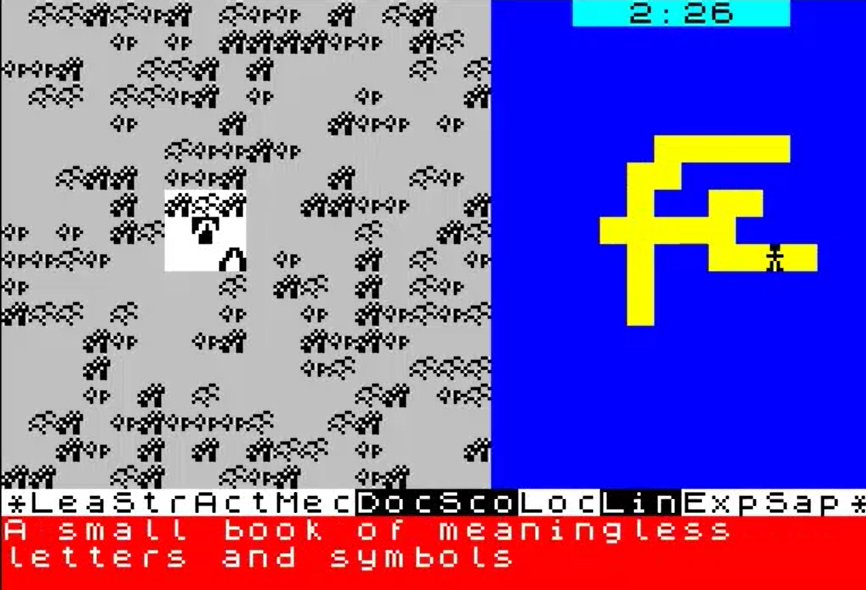
South of one of the caves, I find a lake. My men are afraid of drowning and refuse to explore it, but of course the game has a “DIVer” skill just for that situation. When I first tested the game (with the help of commenters on the forum), I found a map of the area in a lake, so I feel it is worth spending a first leader skill to investigate the lake further:
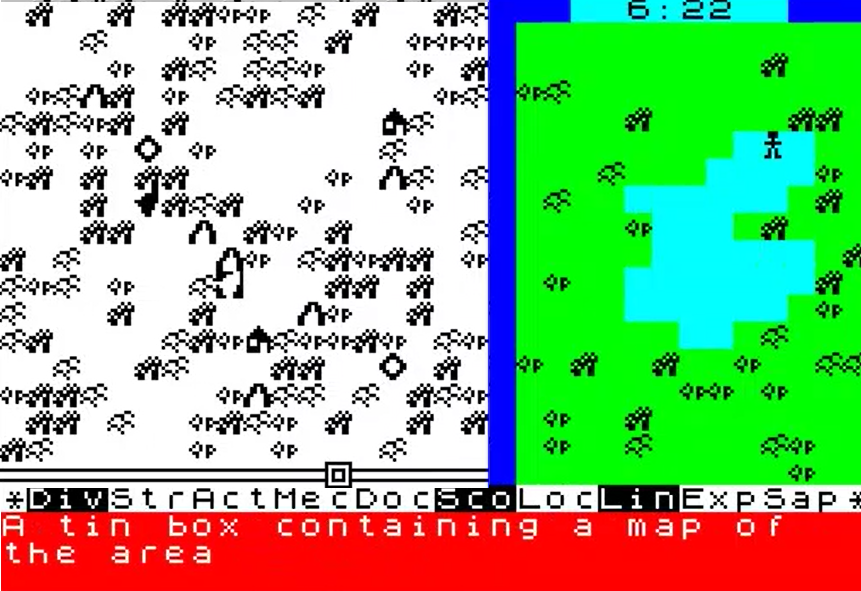
Perfect! In addition to the compound and the road leading to it at the bottom of the map, I know the location of:
- Another lake,
- 4 more caves,
- 2 houses
- 2 “potholes” (the diamonds) – I am not sure why they are called so, because when you approach them they are described this way:

I ignore the potholes as they require the CLImber skill, but tour the other spots. I visit the lake first, as my Leader/Diver skill is still active – all I find is a rusty set of keys. In one of the caves I find “a dead German in a very shabby-looking uniform”, but all I could pick from him was a pass. Another cave has “a dead civilian carrying some technical drawing which shows a tunnel running alongside a road“. Finally, the two last caves gave me a “T-shaped key” and “a bunch of large brass keys” – I forget to TAke the latter, but this did not turn out to be a problem. As for the house, one had a functioning radio and the other had Resistance workers who held me captive for one hour – I wonder whether anything more useful can be done with them.
I also encountered 2 more German patrols, as easily dispatched as the first one, and now I am carrying no fewer than 10 German uniforms with me!

Before entering the compound, I fiddle a bit with a location on the road where I can hear “running water”. Commenter Operative Lynx has suggested using the SAPper skill, and it worked – honestly I don’t understand the logical leap there.

The manhole can then be opened with the T-key, but I could not get into it as it was “full of water”, and even the DIVing skill did not help.
In this instance, I abandon the manhole and head toward the compound.
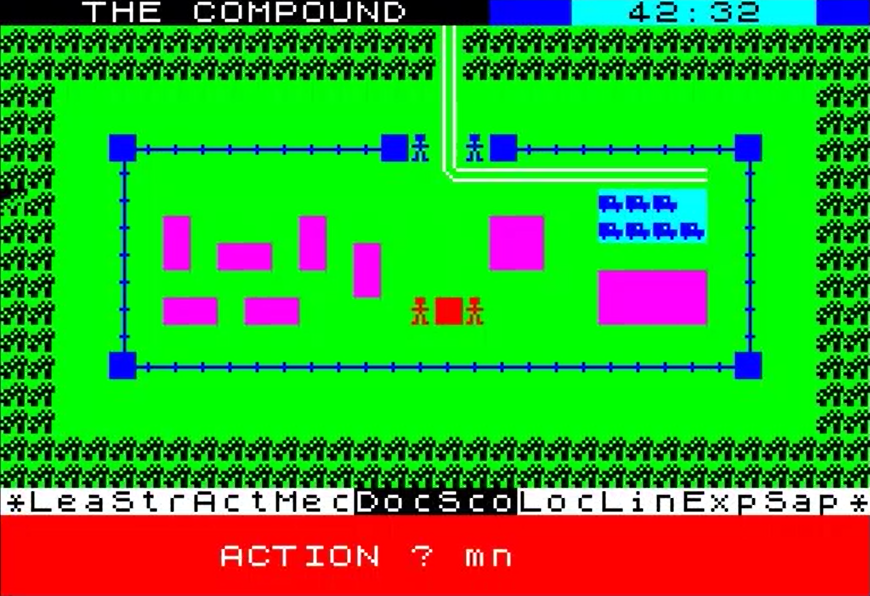
The compound has only one open access, everything else is surrounded by a fence, itself surrounded by mines. The mines can be neutralized with the SAPper skill, but just crossing the “empty” space between the forest and the fence is a luck roll with very little chance not to be detected by the guardtowers, which is immediate game over. In the rare cases where you would be lucky enough to reach the fence, fiddling with it will trigger an alarm system, and that’s game over too. I think the whole thing is a red herring.
This leaves the main entrance. In my test game, despite the passes, the uniforms and the ACTor skill, I could not initially prevail over the German passion for ID checks.

The guards being suspicious is an immediate death sentence, as it triggers this:

I must now confess something that will get me banned from Jason Dyer’s blog: I was stumped by this puzzle. Commenter Operative Lynx, however, found the solution: use the FORgery skill (from the leader) to turn the passes with dead soldiers’ faces on it into passes with the faces of distinguished linguists and Shakesperian Schillerian actors.

The forged passes, in combination with the uniforms, the ACTor skill and (maybe) the LINguist skill allowed us to make it through!
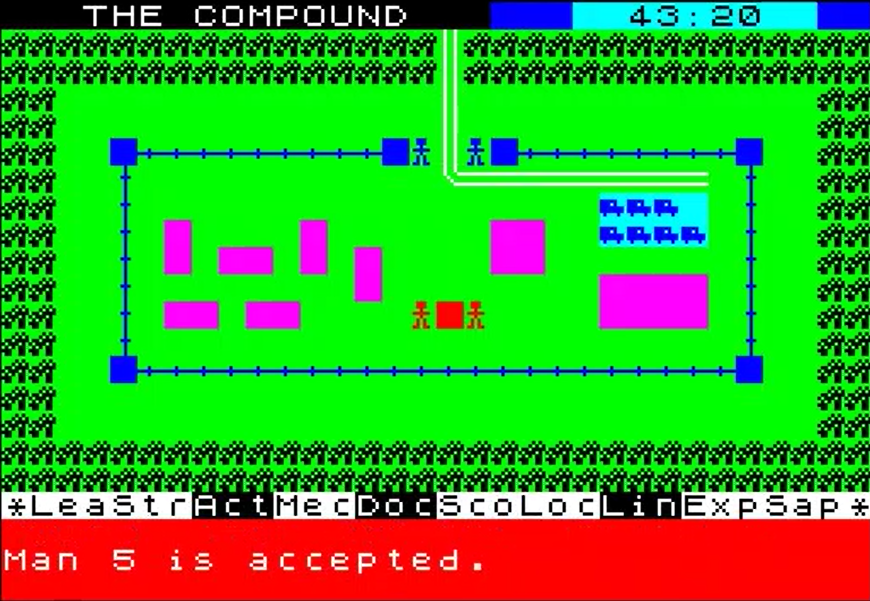
The compound is disappointing. The purple barracks can’t be entered, and any “search” will arouse suspicion from invisible Germans, who will immediately check your papers, find nothing wrong with them, and let you go because yes your uniforms are blood-stained but the papers are in orders so certainly everything is normal.
The only point of interest is the entrance to the complex (in red). Alas, it requires a password, and the guard won’t take discussions of the use cases of Konjunctiv I vs Konjunctiv II as an answer. However, the leader can suddenly become a high-functioning individual and use the CIPher skill on the mysterious book. It reveals the code, allowing us to step in the compound.

The compound is a mix of corridors and rooms, with guards who will also indulge in Germany’s great passion. Those guards are more thorough than the ones on the surface, and in my test game they would catch me often enough, presumably because my men were wounded but possibly because I lacked a linguist, that even savescumming did not cut it. But in this playthrough, no one can resist the sheer nerd power of a healthy linguist trying to explain Dialektologie. The guards just let me pass as fast as they can, letting me explore the complex freely. They don’t even object when I PICklock the doors – I should have used the brass keys but I had forgotten them.
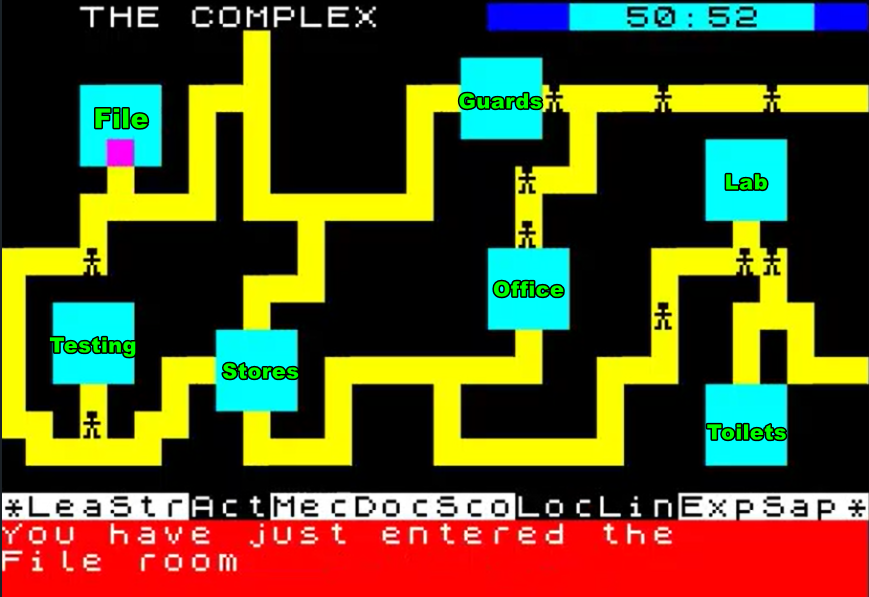
I explore the complex fully, even finding its two alternative exits (the manual warns you can only use them to get out if you used them to get in), but I don’t find the place I am supposed to destroy. I can’t do anything in any of the blue rooms either – just like with the barracks any SEarch action is seen by the guard as an opportunity to indulge in their little hobby. I always pass, but the action is cancelled.
It takes me a few long minutes to discover a corridor West of the file room, which means the corridor at the top of the map is not an exit but a passage, and there I find the “Production Area”:
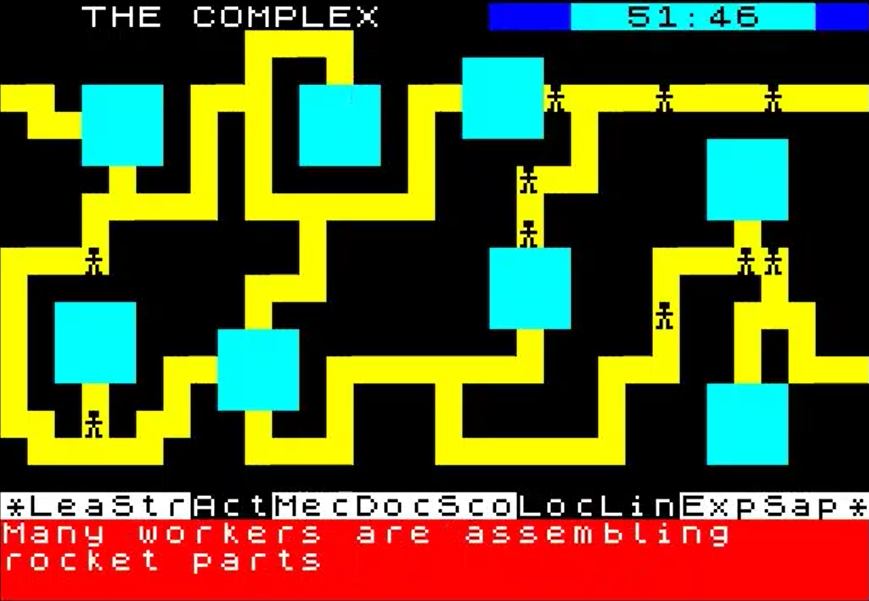
Well, that’s my target indeed. I was afraid that finding or making the explosives was going to be a puzzle, but it turns out I just need to activate the EXPlosive skill:

A footnote in the manual tells you to join a plane “at the opposite of the compound” once you’ve accomplished your mission, and that’s exactly what I do without any issue.
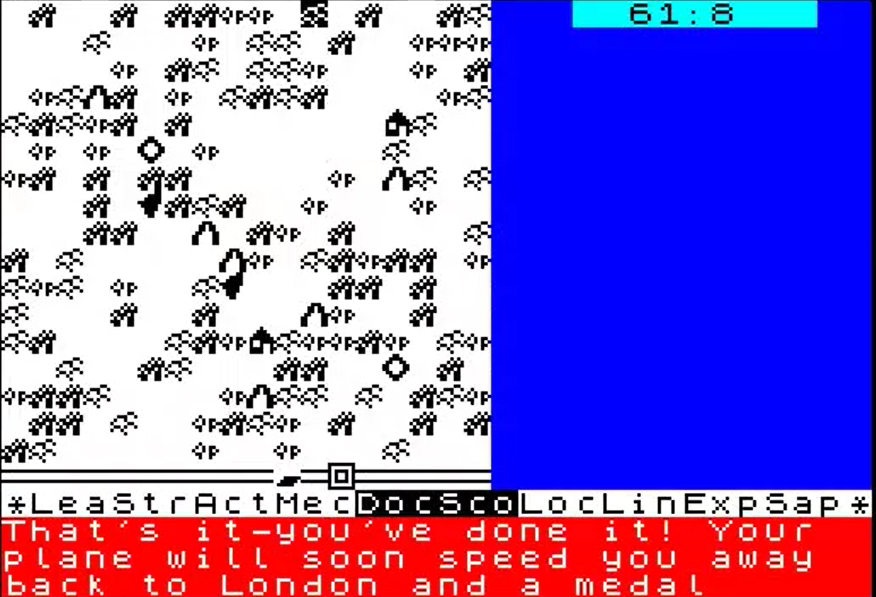
A few extra notes on the game:
- The two “potholes” had for the first one a dead civilian with a bag full of valves (you can take them), and for the second one a dying Frenchman telling you to meet… someone or something… one mile [tile] to the North in one hour. I could never find anything at the rendezvous point, nor find a usage for the valves.

- In my test game, searching next to the compound, I found a tower where a small person could enter, but it was full of gas, and I didn’t know how to remove it. Maybe the valves? But if so I never had the skillset to do it,

- Next to the compound, there is a guarded “pothole” that can only be found by searching. Once the guards are eliminated, you can get into the pothole (using the ACRobat skill instead of the CLImber skill), which leads to tunnels that are eventually blocked by a wall. I stopped there during my test game, but after finishing this game I tested further and found out you can blow up the wall with the EXPlosive skill – this is an alternate access to the complex. You probably won’t have the forged passes, but worry not: in the complex you can neutralize the guards with UNArmed combat, removing them forever from the map!

- Turning on the radio (with the RADio skill, of course) sometimes allows you to hear a disabled lorry calling for help. If you move fast enough, you can then find it on the road and kill the Germans inside, then repair it with MEChanic, then drive it with VEHicle and then go to the compound… where you’ll be asked for your passes all the same, so I have no idea how it could be useful.

- The last survivor of a German patrol sometimes surrenders, but I never managed to make them spit the code (or anything, really), even with a combination of INTerrogator and LINguist. The game acknowledges the presence of the surrendered German on the tile, but I did not find a skill that generated a response.
- I found out the purpose of the Sniper skill (it eliminates one German at the beginning of every encounter with a patrol), the Cartography skill (it keeps explored areas “explored”, but of course becomes useless once you’ve found the map) and the Navigator skill (it gives you the direction of the compound – actually useful if your mission is “Photograph the compound in fewer than 10 hours“). I am particularly puzzled at the existence of a “pilot” skill, given I did not have to pilot that plane myself.
Rating & Review

Special Operations by Keith Hunt, published by MC Lothlorien, UK
First release: May 1984 on ZX Spectrum
Genre: Adventure
Average duration of an operation : 1 hour once you know what you are doing
Total time played: 4 hours
Complexity: Easy (1/5)
Final Rating: N/A
Ranking at the time of review: N/A
MC Lothlorien has been around since 1982, and a lot has happened since I introduced them. Mike Cohen and Roger Lees, the two friends from Chesire, had released at a rapid pace wargames of dubious quality (10 games covered and only one rising above the Obsolete category) and that had worked for them. In particular, the success of their second-generation wargames (Johnny Reb, Redweed, Paras and Battlezone 2000) had attracted programmers hoping to be published by the now-established company. This looked like a great avenue for growth, and in the second half of 1983 Lothlorien started publishing games done externally. This opened a weird period for Lothlorien during which they started churning all sorts of games: arcade, educational, RPG, utilities and, of course, adventure games like Special Operations. At the same time, Lothlorien continued to develop games internally and actively ported its games on as many platforms as possible: Special Operations for instance was ported on BBC Micro, Oric, MSX, Commodore 64 and Amstrad CPC.
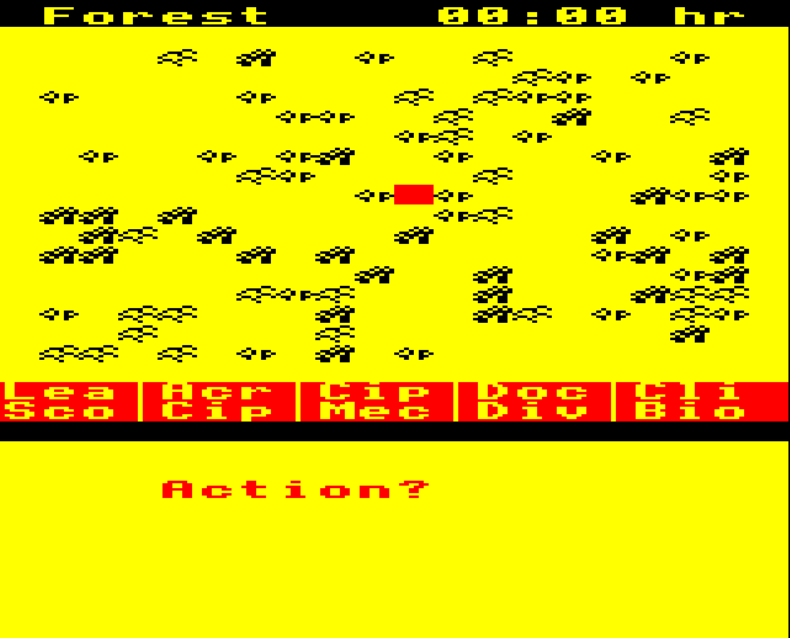
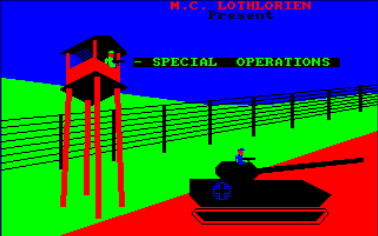
MC Lothlorien’s catalogue proliferated and late 1983, its games were reorganized along 3 brands: Warmaster, Actionmaster and Adventuremaster. Warmaster was large as it included all the back catalogue, but Actionmaster was growing the fastest, possibly because, as Lees admitted candidly to Crash, arcade games were easy to review. Adventuremaster was the smallest brand, with only an handful of adventure games and the RPG Masters of Serebal, covered by the cRPGAddict. I don’t think this diversification strategy worked for them – by 1985 most of MC Lothlorien’s releases were wargames again.
As for Keith Hunt, I could not find anything on him, and neither could the Addict. He is the author of Master of Serebal and an air tactics game called Red Baron that I will play eventually – that’s all we know.
I can’t really rate the game – it is not a wargame – I will note however that the user experience is subpar: to move up you need to type for instance mn [for move North) for each tile travelled, which in tunnels is quickly tiresome. The game is also slow and has no save feature, so given how lethal the compound is when you don’t know what you have to do, Special Operations must have been horrible to play in the 80s. On the other hand, the mission objectives follow a nice progression, so you could probably return home with small victories when you discover the game.
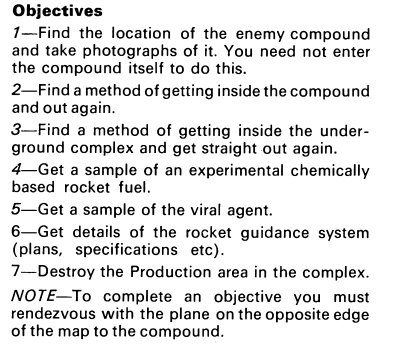
I can’t say I loved the game, but it was an interesting detour and I am curious to know what I missed. I also respect a game that let’s build your own team – Maniac Mansion did not do it first – and how Special Operations almost always gives you 2 if not 3 ways to overcome obstacles. On the other hand, the “tactical” part of the game detracted from the overall experience and I actively disliked encountering German patrols. It was also probably a marketing mistake, as the game was generally classified in the wrong genre – and one in which it could certainly not shine.
Checking the reviews it received, Noel Williams writing for the Micro Adventurer (July 1984) “heartily” recommended it, explaining it was both a wargame and an adventure game. Amusingly, most of the other reviews describe Special Operations as a strategy game, Sinclair User (June 1984) even compared it to Squad Leader! and rated it 8/10. Similarly, Crash (October 1984) called it a “dauntingly complex wargame” (October 1984) but not a great one (only 6 in “overall value”). Worse: Big K (November 1984) described it as “Another of those Lothlorien strategy things where poor graphics and sluggish responses make play a bore. […] This just seems pathetic.” Finally, MSX Computing (December 1985) properly calls it a “graphics adventure game”, albeit one requiring strategy.
Abroad, the Italians of i Magnifici Sette (April 1986), the Spaniards of Micromania (May 1986) and the French of Tilt (June 1987) also classified it as a wargame, but their coverage was so short they probably just checked the art.
We’ll return to wargames next, but remain on the Spectrum. Meanwhile, Operative Lynx can go to the Adventurer Guild and claim 10 Companion Assist Points. They don’t know me there, but I am sure that if he insists a bit I am sure they will understand the situation!